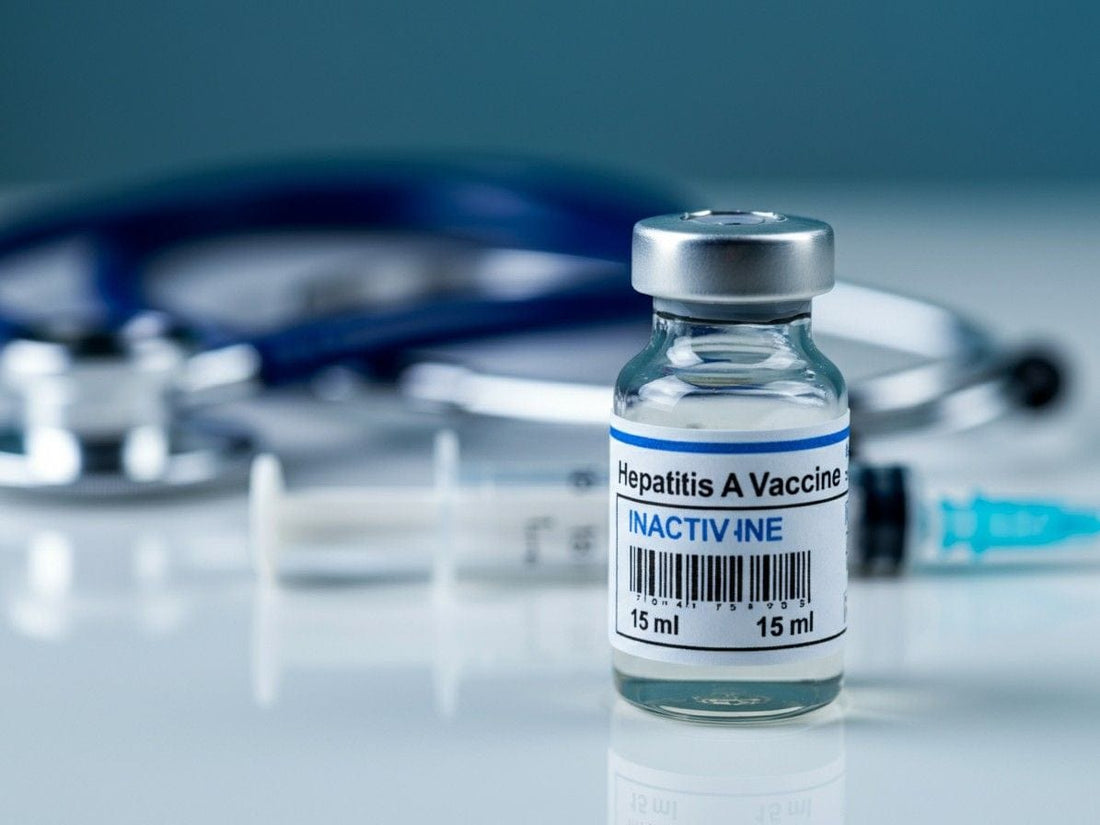Hepatitis A Vaccine: How Long Does It Last?
 Written By
Blen Shumiye, MD
Written By
Blen Shumiye, MD

Hepatitis A is a contagious liver infection caused by the hepatitis A virus (HAV). It spreads primarily through ingestion of contaminated food or water, or through close contact with someone who is infected. Although it rarely becomes chronic, hepatitis A can cause severe illness, hospitalization, and in rare cases death, especially in older adults or individuals with pre-existing liver disease.
The good news is that hepatitis A is preventable through vaccination. Since its introduction in the mid-1990s, the hepatitis A vaccine has proven highly effective in reducing disease rates worldwide. But a question that often arises is: How long does the hepatitis A vaccine provide protection? Do you need booster shots? Will it protect you for life, or only for a few years?
This comprehensive article explores the duration of immunity provided by the hepatitis A vaccine, evidence from clinical studies, current public health guidelines, and what you should know about boosters, protection, and long-term safety.
What is hepatitis A and why does vaccination matter?
Hepatitis A is a liver infection caused by the hepatitis A virus (HAV).Understanding your early signs of liver disease can help you take action sooner. It spreads primarily through contaminated food or water, or through close contact with someone who is infected.
Symptoms may include:

While most people recover fully, the illness can last weeks or even months. In some cases especially in older adults or people already living with liver disease it can cause serious complications.
The vaccine protects you without putting you through that risk. It trains your immune system to recognize HAV and build defenses, so if you’re ever exposed, your body is ready.
How does the hepatitis A vaccine work?

The hepatitis A vaccine uses an inactivated virus. That means the virus particles are killed and cannot cause disease. Instead, your immune system learns to recognize HAV and creates antibodies against it.
Here’s what happens after you’re vaccinated:
-
After one dose: About 95% of healthy adults and children develop protective antibodies within 2–4 weeks.
-
After completing the series: Nearly everyone reaches long-lasting immunity.
-
Over time: Antibody levels may slowly decline, but your immune system retains “memory cells” that can quickly fight off infection if you’re exposed years later.
This combination of measurable antibodies plus immune memory is why the vaccine lasts so long.
How long does hepatitis A vaccine protection last?
The short answer: at least 20 years, and likely for life.
Evidence from studies
-
10 years: Early research showed strong immunity a decade after vaccination.
-
20 years: Long-term follow-up studies found antibodies still present two decades later.
-
Beyond 25 years: Mathematical models predict protection will last at least 25 years in adults and up to 40 years in children.
Even if antibodies fall below measurable levels, your immune system can still mount a defense because of immune memory.
Expert consensus
According to the World Health Organization (WHO) and the U.S. Centers for Disease Control and Prevention (CDC), if you complete the recommended vaccine series, you are considered protected for the long term. Boosters are not needed for healthy people.
Do you ever need a booster dose?
For most people: no booster is necessary.
Here’s a closer look:
-
Healthy adults and children: Once you finish the 2-dose (or 3-dose combination) series, you don’t need extra shots.
-
Travelers: If you completed your series years ago, you’re still covered. No need to repeat before a trip.
-
If you only had one dose: You’re protected in the short term, but a second dose ensures decades of protection.
-
People with weaker immune systems: If you’re living with HIV, receiving chemotherapy, or taking immune-suppressing medications, your provider may check your antibody levels and recommend a booster.
To support your immunity and overall wellness, you can explore the best vitamins for liver health.
What affects how long your protection lasts?
Everyone’s immune system responds a little differently. Here are key factors:
-
Age at vaccination: Children often hold onto immunity longer, though adults also develop strong, long-lasting protection.
-
Immune system health: People with weakened immune systems may not maintain antibodies as well.
-
Underlying liver conditions: If you live with chronic hepatitis B, hepatitis C, or another liver condition, the vaccine is especially important. Protection may need to be checked. If you have chronic liver conditions, staying informed on how to reduce liver inflammation quickly is critical.
-
Where you live: In places where hepatitis A is more common, natural exposure can sometimes act like a “booster” by reminding your immune system.
Is one dose enough?
While one dose gives excellent short-term protection (about 10–11 years for most people), two doses are still recommended in most countries.
Why? Because the second dose ensures your immunity lasts for decades, even if you’re never naturally exposed to the virus again.
Some countries, like Argentina, use a single-dose childhood program and have seen hepatitis A cases drop dramatically. Still, most guidelines continue to recommend completing the full series for the longest-lasting protection.
How does the vaccine compare to natural infection?

-
Natural infection: If you get hepatitis A, you’ll likely have lifelong immunity afterward. But the illness itself can be miserable—and sometimes dangerous.
-
Vaccination: Provides the same long-term immunity without the risks of severe illness, hospitalization, or liver complications.
For your health, the vaccine is the much safer route.
What if you’re not sure if you’re vaccinated?
If you don’t remember whether you had the hepatitis A vaccine, you have two options:
-
Blood test: An antibody test (HAV IgG) can show if you’re already protected.
-
Re-vaccinate: If records are missing, it’s safe to simply repeat the vaccine series. Extra doses won’t harm you.
Should you check your antibody levels?
For most healthy people, there’s no need to test antibodies after vaccination. Your protection is assumed once you finish the series.
Testing may be useful if you:
-
Have a weakened immune system
-
Live with chronic liver disease
-
Are unsure of your vaccine history and need proof for travel or work
In those cases, your healthcare provider may order an antibody test.
Who benefits most from hepatitis A vaccination?
The vaccine is important for everyone, but especially for:
-
Travelers to areas where hepatitis A is common
-
People with chronic liver disease (hepatitis B, hepatitis C, cirrhosis)
-
Men who have sex with men
-
People who use injection or non-injection drugs
-
People experiencing homelessness
-
Healthcare and childcare workers
Is the hepatitis A vaccine safe?
Yes. The hepatitis A vaccine has been used for more than 25 years worldwide and is considered very safe.
Mild side effects may include:
-
Soreness at the injection site
-
Headache
-
Tiredness
-
Mild fever
Severe allergic reactions are extremely rare. No long-term side effects have been linked to the vaccine.
What do major health organizations recommend?
-
WHO: Two doses protect for decades; no booster is needed for healthy people.
-
CDC: Same guidance, complete the series and you’re protected for life.
-
Public Health England: Boosters not required; some travelers may be offered a reinforcing dose after 25 years.
-
Australia & Canada: Similar recommendations on routine boosters after completing the schedule.
How has the hepatitis A vaccine changed public health?
Since the vaccine was introduced in the 1990s:
-
U.S. hepatitis A cases dropped by more than 90%.
-
Outbreaks are now rare and usually affect unvaccinated groups.
-
In countries with childhood immunization programs, hepatitis A has almost disappeared.
The vaccine not only protects you, it helps protect your community through herd immunity.
Key takeaways
-
After completing the hepatitis A vaccine series, you’re protected for at least 20 years and likely for life.
-
Healthy people do not need boosters.
-
One dose protects you in the short term, but two doses lock in long-term protection.
-
People with weaker immune systems or liver disease may benefit from antibody checks or extra doses.
-
The vaccine is safe, effective, and has nearly eliminated hepatitis A in countries with widespread use.
Final thought
Getting vaccinated against hepatitis A is one of the simplest steps you can take to protect your liver health. Once you’ve completed the full series, you can feel confident knowing that your protection will last for decades—most likely for life. You don’t need to worry about regular boosters or repeat shots, unless your healthcare provider recommends them for special circumstances.
Think of it as long-term peace of mind: one decision today that safeguards your health for years to come. And if you ever feel unsure about your liver health, remember that support and testing options—like Ribbon Checkup’s at-home liver test—are always available to help you stay informed and in control.
If you want to check in on your liver health, Ribbon Checkup offers easy at-home liver tests that give you peace of mind. Pairing preventive care with trusted information is one of the best ways to protect your health.
Related resources
References
admin. (2025, January 31). How Long Does the Vaccine for Hepatitis A Last? - Brixton Travel Clinic. Brixton Travel Clinic. https://travelclinicbrixton.co.uk/how-long-does-the-vaccine-for-hepatitis-a-last/
CDC. (2025, January 31). Hepatitis A Vaccine Administration. Hepatitis A. https://www.cdc.gov/hepatitis-a/hcp/vaccine-administration/index.html
NaTHNaC - Hepatitis A. (2019). Travelhealthpro.org.uk. https://travelhealthpro.org.uk/factsheet/21/hepatitis-a
Raczniak, G. A., Thomas, T. K., Bulkow, L. R., Negus, S. E., Zanis, C. L., Bruce, M. G., Spradling, P. R., Teshale, E. H., & McMahon, B. J. (2013). Duration of protection against hepatitis A for the current two-dose vaccine compared to a three-dose vaccine schedule in children. Vaccine, 31(17), 2152–2155. https://doi.org/10.1016/j.vaccine.2013.02.048
UK. (2024, February 20). Hepatitis A information sheet. GOV.UK. https://www.gov.uk/government/publications/hepatitis-a-infection-prevention-and-control-guidance/hepatitis-a-information-sheet--2

Dr. Blen is a seasoned medical writer and General Practitioner with over five years of clinical experience. She blends deep medical expertise with a gift for clear, compassionate communication to create evidence-based content that informs and empowers. Her work spans clinical research, patient education, and health journalism, establishing her as a trusted voice in both professional and public health spheres.



